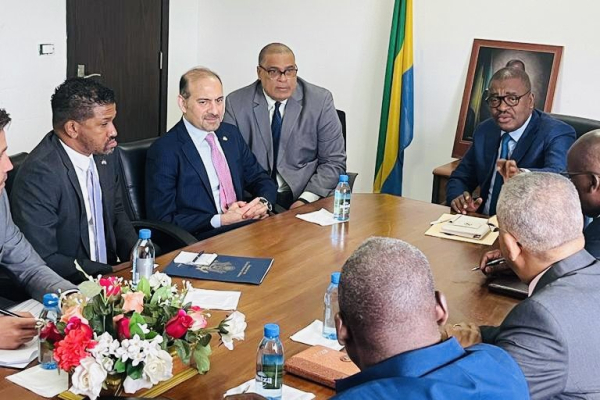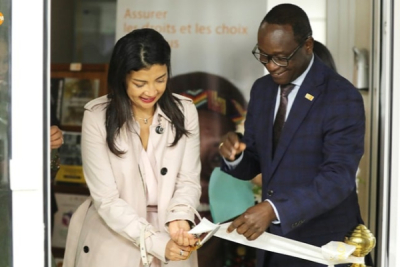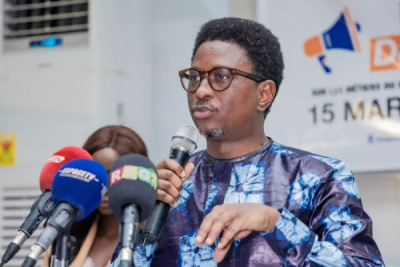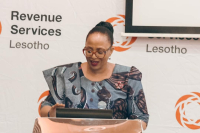
News (1795)
Gabon’s digital transformation strategy provides for the creation of several digital infrastructures to develop the ICT industry. Several players have recently sent proposals to help the government successfully implement that strategy.
The Gabonese Minister of Digital Economy, Jean Pierre Doukaga Kassa, received Thursday, an American delegation led by Dilawar Syed, Special Representative to the United States Office of Economic and Business Affairs.
On social media, the Ministry of Digital Economy said that the delegation came "to [express] U.S. [companies’] will to support Gabon in its major digital investment projects.”
The two parties reviewed the areas of cooperation between Gabon and the U.S., but also U.S. companies’ support in the development of the Gabonese digital ecosystem through the construction of infrastructure (backbone and data center), innovation (start-up and training), as well as the improvement of the legislative and regulatory framework specifically in the fight against cybercrime and cybersecurity.
The visit comes in a context where Gabon is working to further develop its digital sector so that it can make a greater contribution to the transformation of its economy. Since 2009, through the strategic plan Emerging Gabon 2025, the government is working to make Gabon a model in the African digital sector by 2025.
Over the past few months, the country is visited by foreign investors who are offering to support the country in achieving its goal. Earlier this month, the Minister of Digital Economy also received a delegation of Indian businessmen who offered their expertise for the construction of data centers in the country.
On Twitter, Dilawar Syed said that the visit of U.S. investors comes in the wake of the U.S.-Africa summit and responds to the willingness of U.S. President Joe Biden to assist African countries in their digital transformation.
Samira Njoya
Africa is attracting a rising volume of venture capital but, most of the funds go to startups in a handful of countries.
Factor[e] Ventures, a team of company builders that invests in early-stage startups in sub-Saharan Africa and Southeast Asia, has launched Delta40, a startup studio specifically focused on Africa.
Per its website, Delta40’s “mission is to increase incomes and tackle climate change in Africa by building high-impact, technology-enabled energy, agriculture, and mobility ventures led by diverse, experienced founders.”
“A decade of investing in energy, agriculture, mobility, and water innovations in emerging markets has affirmed that there is a great opportunity at the formation stage to support local and diverse founders as they connect their technologies and markets,” said Factor[e] Ventures co-founder, Morgan DeFoort.
The startup studio will invest between $100,000 and $600,000 to create and support African startups specializing in energy, agriculture, and mobility –the sectors that captured 8% of the overall VC funding attracted by Africa in 2022, according to Partech Africa.
With the launch of Delta40, Factor[e] Ventures aims to boost the volume of VC financing attracted by African startups and encourage investors to fund even more startups in the targeted sectors. In addition to providing capital, Delta40 will also act as a co-founder, offering product testing, technology brokering, early-stage commercialization, and accelerating company creation.
Delta40 has secured funding and support from several private and public institutions, including the Autodesk Foundation, the Global Energy Alliance for People and Planet, and the climate technology law firm Wilson Sonisi. The startup studio will be based in Kenya, with operations in Nigeria.
Samira Njoya
Liberia's financial sector faces several challenges, including inadequate ICT infrastructure. The existing payment infrastructure deployed in 2016 has served the country well over the past six years but requires urgent upgrading.
The African Development Bank (AfDB) will finance the Liberia Payments Infrastructure and Systems Upgrade Project. For the said project, the Board of Directors of the African Development Fund, the AfDB's concessional lending window, approved a $3.9 million grant on Friday, March 17.
“The modernization of Liberia’s payments infrastructure and systems to improve payments efficiency will not only strengthen the formal financial sector but contribute to greater financial stability and improved private sector development,” explained Benedict Kanu, African Development Bank country manager for Liberia.
According to an AfDB release, the financing will target the automated check processing and automated clearing house systems, as well as the real-time gross settlement systems that form the backbone of payment processing in the country's financial sector.
It will also finance the upgrading of the Central Bank of Liberia's main data center and “impact the institution and government ministries involved in the payment.”
The main objective is to strengthen Liberia's payments ecosystem for increased efficiency and to foster growth and innovation, as well as financial inclusion, which currently stands at 44.2 percent according to the World Bank's Global Findex 2021 database.
Samira Njoya
With the improvement in internet access, the rise in smartphone adoption, the drop in the costs of sensors, the development of the cloud, etc… Africa has the opportunity to become a real player in the development of the internet of things. In that context, Nigeria is upping its investments in the sector.
E-Space, a global satellite communications company, announced, Monday, it has secured landing rights in Nigeria for its upcoming constellation of low-orbit satellites.
The approval issued by the Nigerian Communications Commission gives E-Space the right to deploy its satellite system, which will "provide communications services and connect Internet of Things (IoT) devices throughout Nigeria in many of the hardest-to-reach parts of the country, particularly those areas currently unserved by terrestrial providers."
Nigeria is among the many nations that are leveraging the Internet of Things to address a wide variety of national challenges while implementing solutions to grow their economy. In 2018, U.S. giant IBM and agritech company Hello Tractor, which has a presence in Nigeria and Kenya, partnered to develop an AI and blockchain platform for African farmers. The partnership has enabled the installation of connected objects equipped with sensors in farms to collect and transmit data on rainfall, plant predators, input use, etc.
The landing right opens a new era in the field and paves the way for future collaboration between E-Space and the country's government, businesses, and communities. The collaboration can lead to the development of the ecosystem and applications needed to develop the local economy and create new jobs in a range of fields, including engineering, and data analysis.
The youth needs digital skills and opportunities to make a productive contribution to the digital future envisioned by leaders. To that end, authorities in various countries are implementing actions to develop talents and open new horizons.
Last Monday, Malagasy First Lady Mialy Rajoelina (photo, left) inaugurated a digital incubation center funded by the United Nations Population Fund (UNFPA) in Antananarivo to support young people with innovative ideas and projects.
According to Ms. Rajoelina, the "center will go a long way in ensuring access to digital education, especially for [...] young girls.”
“Education is not only a fundamental human right. It is also the guarantor of the sustainable development of our society and our country," she said
In Madagascar, young people still face significant hurdles in their bid to access digital education. Apart from internet access challenges, they also face inconsistent electricity supply and a lack of ICT tools to learn, develop, and share digital solutions.
According to data from the International Telecommunication Union (ITU), in 2018, for every 100 people in Madagascar, only 0.12 had a fixed internet subscription, which is about 33,600 people in a country with a population estimated to be 28 million.
The new incubation center will therefore address some of the country's ICT infrastructure challenges. Located in UNFPA's Antananarivo office, it offers free access to a range of ICT tools and other support. It also has an annex in Tulear, in the Atsimo-Andrefana region.
According to the region’s governor Edally Tovondrainy, the annex will help young people build their talents and launch innovative projects to develop the region, which is the largest in Madagascar.
Samira Njoya
To prepare its youth for the digital future, the Republic of Guinea has decided to train them by setting up an innovative project.
The Republic of Guinea will finance the construction of a digital village, to the tune of $10 million. The project was announced, Monday, by its Digital Minister, Alpha Bacar Barry (photo), at the opening of a workshop on the project aimed at transforming the national institute of posts and telecommunications into a national institute for digital skills.
According to the official, the village will offer kindergarten-to-University digital training but also host infrastructure for capacity-building and continuing education. It will also host laboratories, incubators, and coworking spaces to develop the country’s digital industry. The digital village will also host all the start-ups and be a place for all digital-related exchanges in Guinea.
With the digital village, Guinean authorities want to develop the digital economy, build local talents, attract foreign investment, export its skills, and participate in global digital exchanges.
The foundation stone of the digital village will be laid next week, Minister Alpha Bacar Barry says.
Samira Njoya
The Cameroonian platform launched three years ago has attracted investments from across the globe. In 2022, it was the Central African startup to attract the second-highest volume of funding.
Blockchain-backed accelerator Adaverse announced Monday a strategic investment in Ejara, the Cameroonian investment platform that improves financial inclusion through blockchain technology.
The investment, whose amount was not disclosed, will support Ejara's drive to empower itself and expand into new markets in Francophone Africa.
“Ejara meets a pressing need across the Francophone region, and we are excited about the business model, which we believe can be replicated across the African continent. They have shown that they understand the people and have built a bridge between crypto and traditional finance, leveraging continuity rather than disruption,” said Vincent Li, founding partner at Adaverse.
Since its launch in 2020, Ejara has completed several funding rounds. The last before this financing was in November 2022, when it secured $8 million from several investors.
To date, Ejara has served more than 33,000 people from Cameroon, Côte d'Ivoire, Burkina Faso, Mali, Guinea, Senegal, and the Francophone African diaspora in Europe, Asia, and the United States. The fintech startup has also launched cross-border money transfers and user-to-user payments for Africans in the diaspora.
With this new funding, it wants to conquer Francophone African countries, democratizing access to crypto-currency investments by offering the average resident the opportunity to invest as little as CFAF1,000 (~$2) and earn interest daily.
Samira Njoya
17 years after its last population census, Nigeria is getting ready for the fifth census of its history. This census is particular in the country’s history as it will be its first digital census. The government is taking every possible measure to ensure smooth operations.
Nigeria has released NGN2.8 billion ($6 million) for the first digital population census scheduled for next May. This was announced by the Minister of Information and Culture, Lai Mohammed, on Wednesday 15 March at the end of the Federal Executive Council (FEC) meeting chaired by President Muhammadu Buhari in Abuja.
According to the official, the money will be used to acquire software for the National Population Commission (NPC). "There was a memo presented by the National Population Commission, seeking some software to allow them to conduct the census in May this year. I believe because of the rescheduling of the elections, they cannot commence the census as scheduled. They sought the Council’s approval for a contract to procure software for the census at the sum of N2.8 billion," said Lai Mohammed.
Initially scheduled to take place between March and April, the digital population census will finally be held in May due to the governors' elections held from March 11 to 18. Last February, the National Population Commission (NPC) signed a groundbreaking $184 million contract with Lagos-based tech company Zinox Technologies to supply technology components and other accessories for the upcoming census.
Samira Njoya
Djibouti Poste wants to position itself as a major digital services provider. For that purpose, it has joined forces with a tech partner, which is experienced in the field.
National postal corporation Djibouti Poste will undergo profound digital transformation in the coming months. The corporation recently partnered with IT company Software Group, which will support it in its IT reforms and digitization projects.
To discuss the partnership, Djibouti Poste’s director general Bahnan Maidal Ali met with Kalin Radev, CEO of Software Group, in Sofia, Bulgaria, on March 11, 2023.
Under the agreement, Software Group will develop, among other things, email management platforms, parcel tracking systems, and online payment tools for Djibouti Post.
Over the past few years, Djibouti Poste has implemented several projects to digitize its services. The corporation has launched several new services, including the E-Suuq service, which allows customers to buy from major platforms including Amazon. It now aims to promote financial inclusion by introducing fintech solutions, starting with savings solutions in the short term.
The corporation is a model in the African postal sector, all thanks to its innovations. Between 2018 and 2019, the postal company gained 59 places in the PricewaterhouseCoopers global ranking of postal companies providing quality services to the population. In the 1st quarter of 2021, it once again jumped in the global ranking, going from the 174th spot to the 73rd.
Samira Njoya
Like many African countries, Lesotho is undergoing digital transformation. The country has digitized some strategic government services and now targets new ones.
Revenue Services Lesotho (RSL) launched, on March 14, an online collection system that allows taxpayers to file tax returns and pay dues online. According to a release issued by the government, the electronic service aims to expand the use of technology and facilitate tax payments.
For some time now, the Southern African Customs Union's (SACU) revenue has been declining, according to Finance Minister Retšelisitsoe Matlanyane (photo). As a result, the country is receiving fewer and fewer resources to finance the national budget.
So, to complement those revenues, Lesotho is implementing a set of measures (including the launch of the new system) to facilitate the collection of taxes and duties citizens and businesses owe the state.
According to Ms. Mathabo Mokoko, the acting commissioner general of the RSL, the new system will greatly facilitate tax filing and payment while reducing transportation costs and the fees needed for manual procedures.
Samira Njoya
More...
Huawei Technologies, a regular participant in major global tech events, once again took part in the Mobile World Congress (MWC) held in Barcelona last February 27-March 2. During this international meeting, its Vice President in charge of Public Relations for Huawei Northern Africa talked to We Are Tech about some of the major themes defended by the Chinese group.
Why is Huawei increasingly interested in the African Cloud?
When we talk about digital infrastructure, what everybody first thinks about is the connectivity part. But, in this current era, connectivity generates a lot of data. And you need to have the right platforms to store and manage all that data. That's why we talk about cloud and data centers.
We believe that the cloud and data centers are an integral part of a country's digital infrastructure. They are crucial to managing the digital transformation that is currently taking place at all levels in many countries. There are already several public cloud offerings- Huawei is obviously making some of those offers- but, in some cases, we have to think about digital sovereignty and sovereign cloud is becoming a strategic topic at the national level to manage issues related to eGovernance, fintech, and other services. Given the importance of that topic, Huawei is trying to raise awareness on it and train competent people at the local level because [having competent local talents ] is also part of the sovereignty we are talking about. We are trying to help start-ups develop their activities in the cloud to gain greater openness and international exposure. For Huawei, cloud computing is very important in all of its aspects and we are initiating actions to support the rapid development of local players in the field.
Earlier, you mentioned support for start-ups. How can the cloud have an impact on their growth?
The cloud allows us to centralize all IT systems and allows everyone to access them in a controlled way, at any time and from anywhere. As a result, it makes exchanges between people easier and more fluid. It also improves companies’ efficiency while fostering the optimization of IT systems. In the old model, each employee uses his or her computer and this is not necessarily efficient, neither in terms of cost nor in terms of maintenance, or performance. The use of cloud technologies improves these aspects and allows a better exchange between the actors since the cloud and the computer systems are accessible from anywhere and at any time, and there are no security problems, loss of data, loss of physical hardware, etc. Clouds are generally subject to extremely rigorous standards.
Cloud computing also offers companies international exposure. For example, an Ivorian startup can sell its services in Singapore without having to deal with geographical constraints. It can access its systems anywhere in the world with the cloud and just present its offers.
In practical terms, how does Huawei support African startups’ cloud adoption?
We have launched a support program essentially forced on cloud technologies. The program called Spark selects start-ups that are offered several incentives depending on their categories. They will receive cloud, artificial intelligence, software, and other tech training since with artificial intelligence, one can improve cloud capabilities. We will also train the startups on how to better use cloud technologies for business operations. We will also subsidize them, give them free access to Huawei's public cloud, and finally provide them with visibility in major events that Huawei takes part in to connect them with our partners, customers, investors, etc. so that they can grow.
What are the countries that have welcomed the program and what are its ambitions for 2023?
The program was launched at the end of last year. In its first stage, it was launched in Egypt, Morocco, and Tunisia. This year, new countries are targeted, including Côte d’Ivoire, Cameroon, and Senegal.
What is the relationship between cloud technologies and connectivity?
To make good use of the cloud, you need good connectivity. If you have a lot of computing power in the cloud and a lot of storage capacity that you access with low bandwidth, it won't work. Connectivity will be a bottleneck in that case. You need a good connection to use the full power of cloud technologies.
5G is now gaining momentum around the world. What is Huawei doing to demonstrate the strategic importance of this technology to public and private actors who still have a wait-and-see attitude on the continent?
For years now, we have been trying to raise stakeholders’ awareness about the true power of 5G. Above all, we are trying to prepare usage scenarios. We are making progress. 5G will arrive this year in some countries and next year in others. In any case, it is coming. But to benefit from the true power of this technology, we need to prepare the use cases that will make the most of it. We will find scenarios that are essentially Business-to-Business (B2B) that will have a greater impact on the digital economy and the economy in general. We are already preparing these use cases with governments, telecom regulators, telecom operators, start-ups, etc.
We are trying to show the way, the opportunities, and what is feasible in the country and also share the experience and the best practices in other countries or regions.
Considering the impact of the digital on the social sector, is Africa ready for 5G usage scenarios that are not essentially B2B?
There are many 5G scenarios whose success varies from one country to another. They may work in some but not in others. In any case, we see obvious scenarios in several African countries. In South Africa, for example, in the mines, 5G has been adopted to improve worker safety. It is no longer necessary for operators of excavators, trucks, and other machinery to be present on site. They are located in rooms and control these vehicles remotely using 5G. This is a real scenario that can be replicated elsewhere. Another scenario that has worked well in other countries and we are seeing the effectiveness is the digitization of ports. Several ports have adopted the 5G around the globe. It has helped improve work and this has had an impact on the economy. For many African ports, increasing efficiency with 5G will have an immediate beneficial impact on the country's economy.
Will 5G be relevant for individual consumers in Africa right now?
Yes, it is relevant. Some scenarios require more bandwidth. During Covid-19 we experimented with distance education. Today it has evolved and distance education allows us remotely attend classes. 5G can also be very interesting in entertainment scenarios. For example, in Barcelona, we showed that the customer experience when watching a match can completely change because you will no longer be limited to the camera angle that the director will choose but you will be able to choose the viewing angle that suits you all by yourself. You will be able to focus on a specific individual, a specific part of the field thanks to ultra-high-definition cameras that will stream the event in 360 degrees.
Even in gaming, an industry whose value is increasing, 5G will impact the customer experience. It will give the opportunity to be immersed in the game. The retail industry will also benefit from virtual malls that can be visited from home. There is a multitude of scenarios. Then each country will develop the scenarios that fit their needs, that fit the local culture, and the local requirements.
Mobile devices play a big role in the development of connectivity in Africa. Why do 5G smartphones cost several times more than 4G-enabled ones?
The first point is that the performance of components used for 5G phones is more complex. There's a lot more complexity, but not just that. You'll also see that the same 5G components will lose value over the years. We're not going to compare 4G and 5G components but only 5G to each other over time and we'll see that there will be a depreciation effect. Those who do research and development invest a lot of money to reach standards and patents. And these costs must be amortized, so a certain volume of components must be produced for these costs to be amortized. This is why, with the increase in the number of 5G subscribers to 1 billion worldwide, the cost of 5G phones is going down. Currently, a 5G phone costs less than 200 dollars, which was not the case last year. The amortization effect on a larger scale really helps amortize the research costs invested in the previous years. This will also be the case for all the organizations that contributed to the development of these components. It is important to remember that the component manufacturers are different from the phone manufacturers.
Keeping in mind that connectivity and the cloud store a vast amount of personal, business, financial, etc. data, what is Huawei doing to ensure that the infrastructure it deploys is secure?
Cybersecurity is the foundation of our work. All the digitization, connectivity, etc. services we offer are meaningless if we can't secure them. When the trust between a user and the system he/she uses is broken, there is no development. Huawei has a strong interest in this issue and this goes back more than 20 years. Huawei has had cybersecurity management mechanisms in place for many years. People are already talking about it a little bit because there has been an increase in Internet usage, but we have been in this segment long before. We have provided equipment in more than 176 countries and there are more than three billion people on our networks. We can't afford to have any failures or concerns about the quality of our products. Concretely, we operate through various aspects.
First, our products are "security by design". This means that the issue of protecting the user of the product or service is integrated right from the design stage. At Huawei, we currently comply with all international cybersecurity standards. We have extremely rigorous procedures for network deployment and maintenance, coupled with monthly reviews. These processes allow us to avoid all types of human error. We have also deployed several transparency centers around the world -- seven -- where all our products and solutions are open to all our partners to test their integrity and robustness.
Interview by Muriel Edjo
The Angolan government wants to make its new airport one of the best on the continent. For this purpose, it entrusted its digitalization to an experienced international company.
Indra, a Spanish company specializing in the provision of digital services, will equip the new airport of M'Banza Congo, in Angola, with the ground and air systems necessary for its operation. According to a release published by Indra last Tuesday, the contract costs €12.5 million.
“The new airport will join the ones in Luanda, Catumbela, and Lubango, which Indra has already equipped with its solutions, making the implementation easier, faster, and more efficient and creating a highly digitized network in the country,” said Berta Barrero, Managing Director of Indra’s Mobility business.
Under the new contract, Indra will install operational systems for communication, security, and control towers at the airport. In the first phase, the company will deploy its AODB-InBase, RMS-InUse, FIDS-InFlight systems, which are designed to collect data on flight plans, and resource allocation at the airport, as well as provide information to passengers.
Indra will also deploy a check-in and boarding system at the airport and install data, telephony, Wi-Fi, and tetra networks. The contract also includes the installation of closed-circuit video surveillance systems, access control, X-ray, perimeter security, public address system, and parking control technologies.
On the airside, Indra will deploy, among others, its ManagAir solution, one of the most mature, robust, efficient, and flexible airspace management technologies available, with which it has modernized control centers on five continents.
Angola is not the only African country where Indria is active. The company has also implemented its solutions at airports in Kenya, Tunisia, Ghana, and Mozambique, among others.
Samira Njoya
African start-ups play a vital role in economic growth and development. They create jobs, solve problems, and positively impact societies. Funding them is therefore more important than ever.
Last Tuesday, Flat6Labs, MENA’s leading venture capital, announced the launch of the Africa Seed Fund (ASF), a new $95 million seed fund aimed at supporting the growth and development of early-stage tech start-ups in Africa.
The venture capital firm informs that ASF will focus on three main investment territories, namely North Africa, West Africa, and East Africa. It will invest in more than 160 early-stage African tech startups over the next five years with check sizes ranging from $150,000 to $500,000.
It will provide beneficiaries with seed funding, regional business support, access to a regional network of experienced mentors, and regulatory and logistical support to set up and grow their businesses. Two cohorts will be run every year, each with an average of 10 to 15 start-ups. The first investments in the selected start-ups are expected before the end of 2023.
Flat6Labs “ will also be providing seed tickets to seasoned founders independently of the program,” the release announcing the ASF explains. According to the release, the large influx of ASF capital is likely to create more than 14,000 jobs, support more than 1,200 founders, 20% of whom are women, and generate more than $700 million in revenue.
“Africa is one of the most exciting regions to invest in tech and innovation, with huge untapped potential and unique business opportunities. We will leverage our experience and knowledge to guide the startup founders to create truly scalable, investment-ready, Africa-based companies,” said Ramez El-Serafy, General Partner for ASF.
The African tech ecosystem has grown significantly in recent years. According to Partech's Africa Venture Capital Report 2022, the ecosystem attracted $6.5 billion of investments in 2022, up by 8% from the $6 billion attracted in 2021.
Samira Njoya
Burkina Faso, like several other African countries, is engaged in the digital transformation process. The country's ambition is to use digital technologies as tools to transform its society and accelerate socio-economic development.
The government of Burkina Faso has selected Bridge Fiber Solutions (BFS) to operate and manage the country's national telecommunications backbone. The company launched its commercial activities in Ouagadougou on Friday, March 10 in the presence of the Minister of Digital Transition, Posts and Electronic Communications, Aminata Zerbo-Sabané (photo, center).
Speaking about this new step towards an effective digital transition, Aminata Zerbo-Sabané said that "the government has made an important investment by building this national backbone that connects the entire territory with fiber optics and gives access to high-speed internet [necessary] to accelerate digitalization to businesses and the public administration.”
With the government's approval, BFS becomes the sole manager of the public backbone network in Burkina Faso. In that light, it will provide telecom companies and other entities with various services such as capacity leasing, dark fiber leasing, wavelength leasing, duct leasing, and Internet access. It will also invest in the modernization and extension of the network as needed.
The national telecommunications backbone project was launched in 2016 to develop national and international connectivity by interconnecting the country’s 45 provinces with a 3,000 km long optical fiber.
According to BFS director general Boris Compaoré, the launch of BFS is the beginning of a long process that aims, in the short term, to reduce the digital divide and offer quality Internet and favorable conditions to various digital companies and the administration at very competitive rates.
Samira Njoya



![Factor[e] Ventures launches an Africa-focused startup studio](/media/k2/items/cache/cbbcf4fa489d61b42aa4a35932850e0b_L.jpg)











